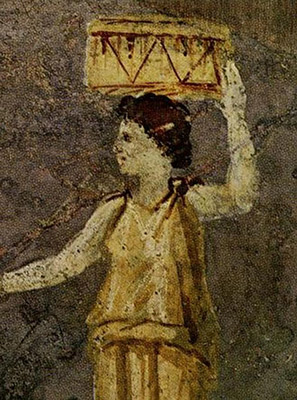Philosophum non facit barba (The beard does not make the philosopher - Plutarch)
 The history of women in philosophy is longer than you might suppose. Although we might not often hear of them, women were present in most of the schools of Greek philosophy. It is not always possible to determine the position they held in each school, nor how influential they were, but women certainly made some contribution to the development of philosophy throughout Greek antiquity.
The history of women in philosophy is longer than you might suppose. Although we might not often hear of them, women were present in most of the schools of Greek philosophy. It is not always possible to determine the position they held in each school, nor how influential they were, but women certainly made some contribution to the development of philosophy throughout Greek antiquity.
Hipparchia was one such woman. She was a philosopher of the Hellenistic age of Ancient Greece and flourished around 328 BCE. While women in fifth-century Athens lacked legal, political and educational rights, in the Hellenistic period women's position improved: they gained economic and legal rights (though few political ones); and they could buy, own and sell goods and property and bequeath them to others. Education for women was becoming more common, and the custom of allowing a woman to perform a public act only with the approval of a man - acts such as marriage or divorce - gradually began to disappear.
It was against this backdrop that Hipparchia, a native of Maronea, met and fell in love with the Cynic philosopher Crates. Hipparchia was a Cynic philosopher too, having adopted the mantle in her mid-teens. At the time she met him, Crates was already an old man, but Hipparchia was determined to marry him and would not be dissuaded. She rejected younger, wealthier, more beautiful suitors because she had fallen in love with "both the discourses and the life" of Crates. Even Crates himself, at the behest of Hipparchia's parents, tried to turn her from her course of action, but it was to no avail. In a last gasp attempt at talking her out of the marriage, Crates threw all his possessions at Hipparchia's feet, declaring:
This is the bridegroom whom you are choosing, and this is the whole of his property; consider these facts for it will not be possible for you to become his partner if you do not also apply yourself to the same studies, and conform to the same habits that he does.
Diogenes Laertius has it that Hipparchia was so keen to marry Crates that she threatened to kill herself rather than live in any other way. Whether this is true or not, Hipparchia certainly did marry Crates, and she went about with him in public, dressed as he did, in a simple mantle or cloak, and having conformed "to the same habits" as his.
The philosophers lived in poverty and together they embodied the fundamental Cynic principles: to live according to nature, thereby eschewing materialism - a principle which was believed to offer the clearest path to the good life; and they embraced self-sufficiency and reason. They relinquished their possessions, obtained their basic needs by begging, and upheld the Cynic value of anaideia (shamelessness): any act sufficiently virtuous to be done in private is virtuous enough to be done in public. It was this value of anaideia which led husband and wife to having sex in public. Augustine tells us that:
[...] Crates of Thebes...was so passionate about Cynic ideas that, leaving behind the wealth of his father, he moved to Athens with his wife Hipparchia, who was an equally zealous follower of his doctrine. And when he wanted to lie down with her in public, and she...pulled over her cloak as a cover, she was scolded by her husband: "obviously you are not yet wise," he said, "since you don't dare to do in the presence of others what you know well to be the right thing to do."
Acceptance of Crates' rebuke, however, does not suggest that Hipparchia was not her own woman. She was unafraid to challenge the men around her, and at a supper being held by Lysimachus, Hipparchia confronted another philosopher, Theodorus, the atheist, proclaiming wittily that:
What Theodorus could not be called wrong for doing, that same thing Hipparchia ought not to be called wrong for doing. But Theodorus does no wrong when he beats himself; therefore Hipparchia does no wrong when she beats Theodorus.
Theodorus was outraged, yet made no immediate remark. Instead, he tore the cloak from Hipparchia's body asking angrily "[i]s this the woman who has abandoned her shuttle by the loom?". "Yes, Theodorus", replied Hipparchia:
I am this woman, but do I appear to you to have come to a wrong decision, if I devote that time to philosophy, which I otherwise should have spent at the loom?"
This and many other stories were told of Hipparchia. To be a woman and a philosopher might have a longer history than we think, but it has rarely been easy.
(Sources: The Lives and Opinions of Eminent Philosophers (1853), Diogenes Laertius; "Dog-love-dog: Kynogamia and Cynic Sexual Ethics", in Sex in Antiquity (2015), edited by Mark Masterson, Nancy Sorkin Rabinowitz and James Robson).







